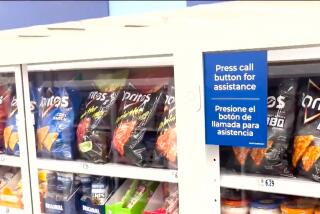Mail-Order Drugstores Face Threats of Criminal Charges
DELRAY BEACH, Fla. — Selma Karpen said she would start picketing if government officials follow through on threats to shut down the mail-order drugstore here.
Karpen, 71, and so many other people have flocked to the Discount Drugs of Canada store since it opened last fall that owner Earle Turow has opened two dozen franchises across the country.
“We’d be devastated if they closed,” said Karpen, who saves over 80% on glaucoma and cancer medications that used to cost her $600 every 90 days.
“I would picket. I would have to do something. And not only me, but a lot of other senior citizens.”
Discount Drugs of Canada is part of a booming Internet and mail-order business that attracts more than 2 million Americans a year.
But state and federal officials, who regulate the distribution and sale of prescription drugs, have recently threatened Turow and other owners of mail-order drugstores with criminal charges and warned that their shops could be shut down.
So far the stores remain open, although Florida Department of Health officials visited two of Turow’s stores with threats to close them, and regulators threatened criminal charges against one of his stores in New York.
Two weeks ago, the Food and Drug Administration, working with the Arkansas pharmacy board, issued its first warning letter to another mail-order drug company in Lowell, Ark. In the letter, the FDA said the company not only violated federal drug-importation laws, it also lied to customers on a Web site that falsely said the drugs were approved by the FDA.
Although the FDA letter targeted only the Arkansas location, “they’re violating federal law wherever they’re operating,” FDA associate commissioner William Hubbard said of the stores.
The FDA has cautioned Americans that the imported drugs could be contaminated. Many of the drugs are the same ones manufactured for sale in the United States.
The drugs are cheaper in Canada because of government caps on drug prices and because of the strength of the U.S. dollar, which has more buying power in Canada.
Turow’s stores and others like them take orders from customers and fax them to a Canadian pharmacy, which then charges customers’ credit cards and ships the drugs directly to them.
Turow won’t comment on his profit margin but said he receives a commission from the pharmacy based on sales.
Turow also said he will open more stores despite the threats; one of them will be in Palm Springs, according to the company’s Web site, the first one in California.
He said the mail-order drug companies accomplish what the government cannot, by helping customers get cheaper prescription drugs from Canada.
He insisted he is not breaking any laws because his store doesn’t import or stock the medications people order.
More important, Turow pointed out, he is providing a service people need.
“We’re not just going to roll over and play dead,” he said. “There has to be a better solution.”
But others are backing away from the business.
This month, the Massachusetts Councils on Aging, a nonprofit agency that advises local senior centers, sent an e-mail cautioning workers against encouraging cash-strapped seniors to purchase prescription drugs in Canada.
In the fall, Minnesota-based UnitedHealth Group Inc., the country’s biggest health insurer, told the senior citizens lobbying group AARP that it would reimburse members of a benefits plan for prescriptions filled in Canada and other nations. But AARP said it has concerns about the practice.
“We don’t encourage it,” AARP spokesman Marty Davis said.
Still, the people who depend on the stores, many of them retirees who have little or no insurance coverage for the drugs, say they have no plans to stop their orders to Canada.
“They’re practically going to cut our throats if they would close these stores. They need to come up with an alternative before they do that,” said Annette Nathanson, an 80-something retiree who lives in Delray Beach.
“Because for some people, you either buy your medications or your food.”
More to Read
Sign up for Essential California
The most important California stories and recommendations in your inbox every morning.
You may occasionally receive promotional content from the Los Angeles Times.










